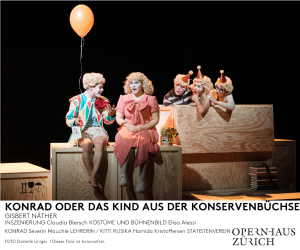 Switzerland Gisbert Näther, Konrad oder Das Kind aus der Konservenbüchse: Instrumental-Ensemble of the Opernhaus Zürich / Ann-Katrin Stöcker (conductor), Studiubühne of the Opernhaus Zürich, Zurich, 22.9.2018. (CCr)
Switzerland Gisbert Näther, Konrad oder Das Kind aus der Konservenbüchse: Instrumental-Ensemble of the Opernhaus Zürich / Ann-Katrin Stöcker (conductor), Studiubühne of the Opernhaus Zürich, Zurich, 22.9.2018. (CCr)

Cast:
Konrad – Severin Mauchle
Berta Bartolotti – Irène Friedli
Egon/Frau Rusika – Valeriy Murga
Teacher/Kitti Rusika – Hamida Kristoffersen
Production:
Libretto – Ulla Theißen
Set and costume designer – Elisa Alessi
Staging – Claudia Blersch
Lighting – Dino Strucken
Dramaturgy – Fabio Dietsche
For children’s literature in Germany, the first decades after World War II were not exactly a high water mark. Lots of pirate stories for boys, lots of pony ones for girls. Something stilted and afraid of addressing anything that resembled a too-dark reality had taken hold, and publishers and readers stuck to their safer classics. The Brothers Grimm and Erich Kästner seemed for a while to be the only big shows in town.
A few writers revolted, and by the 80’s there were finally several authors invested in writing excellent children’s fiction – works rooted in reality but still full of beauty and creative wit. Peter Härtling was one, Mirjam Pressler is another; Austria produced Christine Nöstlinger, who died only a few months ago. Now it is their books that are considered new classics in the German-speaking world.
Nöstlinger’s Konrad oder Das Kind aus der Konservenbüchse (‘the child from the tin can’, published in English as Conrad: the Factory-Made Boy) is one of those classics. Aimed it at an audience of younger children, it has all the intelligence and social commentary of one of her youth novels. Now German composer Gisbert Näther and his librettist Ulla Theißen have produced a children’s opera from it, performed on the Opernhaus Zürich’s Studiobühne. Any effort to nurse a love of opera in children is worthwhile, but this work is an especially lovely investment in opera’s future.
The story does sound a bit German, if you think about it: a boy of seven, Konrad, is manufactured in a factory and sold to a family in a can, like a ration of bland vegetables. And he is indeed bland, for once his new ‘mother’ opens him up, gives him water, and releases him into the wild of her Viennese apartment, he asks not whether he may be allowed to play, but instead if he gives the apartment a once-over with the vacuum cleaner. Industrially designed to be squeakily obedient, the boy threatens to become a big, fat, sweethearted nuisance. His adoptive family see to it that he gets a proper miseducation, as circumstances require. This story and others of Nöstlinger stand athwart the stifling adherence to authority propagated so widely in her time.
Näther and Theißen have given us an hour-long opera with the finest sense of scale for this story and its audience. The proof was in the pudding: at the premiere, a group of mostly very young children (between roughly four and ten) stayed engaged with the story scene for scene. Five instrumentalists, with a healthy dose of marimba and percussion, ambled through the punchy score of serialist, jazzy, melodically ambiguous music. Children’s entertainment that fully absorbs, without a whiff of saccharine glitz? My hat is off to you, Herr Näther.
The wit of the stage and costumes didn’t hurt, either. Large wooden shipping boxes lifted after a musical prelude to reveal the instrumentalists, and those same boxes composed the set. The colour palate of the costumes was full of the sort of pastels that give the eye richness instead of only softness. Elisa Alessi deserves as much praise as the musicians for the vibrancy of her contribution.
The role of Konrad (Severin Mauchle) wasn’t sung but spoken rhythmically, which might have helped the child audience get through the storytelling, but which cost the piece a bit of its dramatic pull in big moments. Mauchle could play with his voice more in future performances; today’s children don’t necessarily need Pierrot Lunaire-style Sprechstimme, but would a little more pitched speaking á la Humperdinck hurt? That said, Mauchle was ever the winsome centre of this tale.
The singing was very good. I relished Valeriy Murga in the role of Konrad’s would-be father; his booming vibrato still left plenty of room for crisp text. There’s no reason Murga shouldn’t embrace the camp of his other role, in drag, as the neighbour’s mother. More playfully, Hamida Kristoffersen was a buoyant and vocally graceful companion to Konrad. A few little gags twinning singers with the musicians worked so well that there is room for much more of this. Ann-Katrin Stöcker’s ensemble was spot on in their ability to tell a musical story; they were in turns small enough for a radio play and big enough for all sorts of chromatic grit.
It seems inevitable that some of those children hearing Näther’s small orchestra today will have a hankering for big-people music one day, and will become fans of Stravinsky, Adams, and Strauss. The Opernhaus Zürich is wise to invest in these young listeners, and lucky to have a team so adept at delighting them.
Casey Creel
